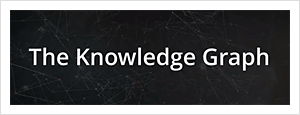Here’s what caught my attention in the data space this week.
Google’s Knowledge Graph
 “Google does the semantic Web,” says O’Reilly’s Edd Dumbill, “except they call it the Knowledge Graph.” That Knowledge Graph is part of an update to search that Google unveiled this week.
“Google does the semantic Web,” says O’Reilly’s Edd Dumbill, “except they call it the Knowledge Graph.” That Knowledge Graph is part of an update to search that Google unveiled this week.
“We’ve always believed that the perfect search engine should understand exactly what you mean and give you back exactly what you want,” writes Amit Singhal, Senior VP of Engineering, in the company’s official blog post.
That post makes no mention of the semantic web, although as ReadWriteWeb’s Jon Mitchell notes, the Knowledge Graph certainly relies on it, following on and developing from Google’s acquisition of the semantic database Freebase in 2010.
Mitchell describes the enhanced search features:
“Most of Google users’ queries are ambiguous. In the old Google, when you searched for “kings,” Google didn’t know whether you meant actual monarchs, the hockey team, the basketball team or the TV series, so it did its best to show you web results for all of them.
“In the new Google, with the Knowledge Graph online, a new box will come up. You’ll still get the Google results you’re used to, including the box scores for the team Google thinks you’re looking for, but on the right side, a box called “See results about” will show brief descriptions for the Los Angeles Kings, the Sacramento Kings, and the TV series, Kings. If you need to clarify, click the one you’re looking for, and Google will refine your search query for you.”
Yahoo’s fumbles
The news from Yahoo hasn’t been good for a long time now, with the most recent troubles involving the departure of newly appointed CEO Scott Thompson over the weekend and a scathing blog post this week by Gizmodo’s Mathew Honan titled “How Yahoo Killed Flickr and Lost the Internet.” Ouch.
Over on GigaOm, Derrick Harris wonders if Yahoo “sowed the seeds of its own demise with Hadoop.” While Hadoop has long been pointed to as a shining innovation from Yahoo, Harris argues that:
“The big problem for Yahoo is that, increasingly, users and advertisers want to be everywhere on the web but at Yahoo. Maybe that’s because everyone else that’s benefiting from Hadoop, either directly or indirectly, is able to provide a better experience for consumers and advertisers alike.”
De-funding data gathering
The appropriations bill that recently passed the U.S. House of Representatives axes funding for the Economic Census and the American Community Survey. The former gathers data about 25 million businesses and 1,100 industries in the U.S., while the latter collects data from three million American households every year.
Census Bureau director Robert Groves writes that the bill “devastates the nation’s statistical information about the status of the economy and the larger society.” BusinessWeek chimes in that the end to these surveys “blinds business,” noting that businesses rely “heavily on it to do such things as decide where to build new stores, hire new employees, and get valuable insights on consumer spending habits.”
Got data news to share?
Feel free to email me.
 OSCON 2012 — Join the world’s open source pioneers, builders, and innovators July 16-20 in Portland, Oregon. Learn about open development, challenge your assumptions, and fire up your brain.
OSCON 2012 — Join the world’s open source pioneers, builders, and innovators July 16-20 in Portland, Oregon. Learn about open development, challenge your assumptions, and fire up your brain.
Related:
